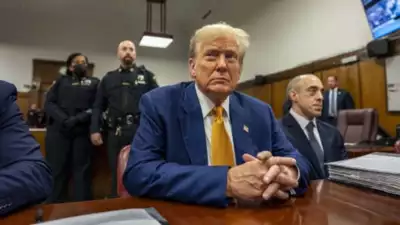
US President-elect Donald Trump‘s legal team filed a motion Monday to dismiss his hush money conviction, arguing it interferes with presidential duties. The filing, made public Tuesday, claims continuing the case would disrupt the presidential transition and disregard voters’ “overwhelming national mandate.”
Prosecutors have until December 9 to reply and said they are open to delaying sentencing until Trump’s second term ends in 2029. Trump’s lawyers called this a “ridiculous suggestion.”
What is the hush money case against Trump?
In May, Trump was found guilty of falsifying 34 counts of business records linked to a $130,000 payment made by his former lawyer, Michael Cohen, to adult film star Stormy Daniels before the 2016 election. Daniels claims she had a sexual encounter with Trump, which he denies. This marked the first time a US president was convicted of a criminal offence.
Trump had pleaded not guilty, calling the case a politically motivated attack by Democrat prosecutor Alvin Bragg to derail his campaign. His lawyers argued that continuing the case could disrupt the government. The offence carries up to four years in prison. However, jail time is considered unlikely for a first-time offender on these charges. As this is a state case, Trump cannot pardon himself.
Trump’s lawyers argue Manhattan district attorney Alvin Bragg’s prosecution is politically motivated, comparing it to President Biden’s criticism of his son Hunter Biden‘s prosecution. They wrote, “President Biden asserted that his son was ‘selectively, and unfairly, prosecuted,’ and ‘treated differently.’”
Trump’s team also contends dismissing the case would allow Trump to focus on addressing New York City’s “deteriorating conditions” and “protect its residents from violent crime.” They added it would allow him “to devote all of his energy to protecting the Nation.”
Judge Juan M. Merchan postponed Trump’s sentencing after the election. He will now consider the dismissal motion along with a previous request from Trump to dismiss the case based on immunity. Merchan’s decision could range from upholding the verdict and proceeding to sentencing, delaying the case, or waiting for a federal appeals court ruling on a separate effort by Trump to move the case.
Prosecutors argued the hush money payment was part of an effort to hide negative stories from voters. Trump’s then-lawyer Michael Cohen made the payment, which Trump later reimbursed and categorized as legal expenses. Trump maintains the payments were legitimate legal expenses.
Trump’s lawyers are also using a recent Supreme Court decision about prosecuting ex-presidents for their official actions to support his case. They claim the jury was shown improper evidence, like his financial disclosures and social media posts. Prosecutors argue this evidence had little impact.
Special Counsel Jack Smith recently withdrew two federal cases against Trump, citing Justice Department policy.






